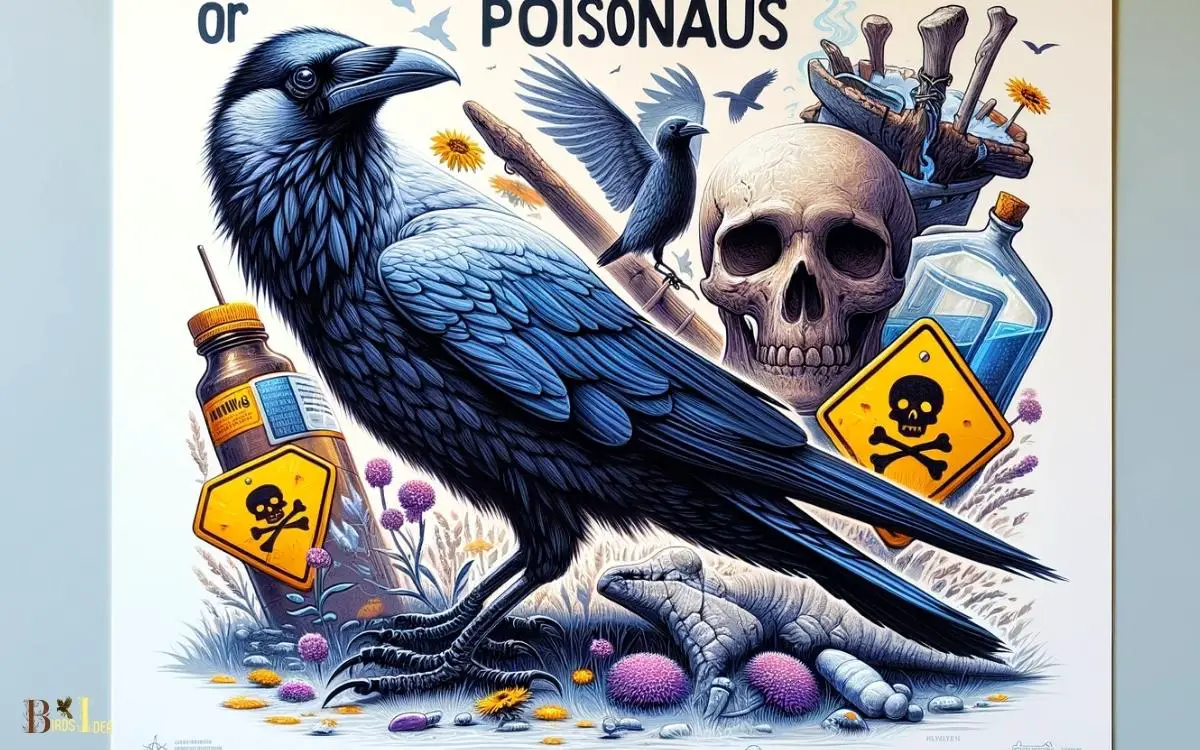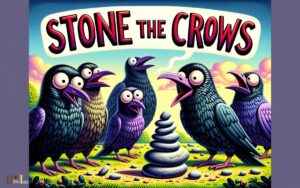What Is Poisonous to Crows? Discover the Surprising List!
Crows can be poisoned by a variety of substances commonly found in human environments, including pesticides, lead, and rodenticides.
It’s crucial to be aware of these dangers to prevent unintentional harm to crow populations. Crows are susceptible to various toxins.
Here are some harmful substances:
To protect crows and other wildlife, it’s vital to manage waste and chemicals responsibly and to be mindful of the potential hazards our everyday products may pose to these intelligent creatures.

Key Takeaway
Common Toxic Foods for Crows
Crows are opportunistic omnivores and can consume a wide variety of foods. However, there are certain foods that can be toxic or harmful to them.
It’s important to note that individual tolerance may vary, and some crows may be less affected than others.
Here’s a table of common foods that are considered toxic or harmful to crows:
| Toxic Food for Crows | Description and Potential Harm |
|---|---|
| Chocolate | Contains theobromine, which is toxic to many animals and can cause digestive and nervous system issues in crows. |
| Caffeine | Found in coffee, tea, and some sodas, caffeine can be toxic to crows, affecting their nervous system and causing heart-related issues. |
| Alcohol | Crows are sensitive to alcohol, and it can lead to intoxication, disorientation, and damage to internal organs. |
| Avocado | Contains a substance called persin, which can be toxic to birds and may cause digestive problems in crows. |
| Onions and Garlic | These contain compounds that can damage red blood cells in birds, leading to anemia. |
| Salt | Excessive salt intake can lead to dehydration and kidney problems in crows. |
| Highly Processed Foods | Foods high in salt, sugar, and additives can be harmful to crows and may contribute to health issues. |
| Bones | Cooked bones can splinter and cause internal injuries to the digestive tract. |
| Moldy Foods | Mold can produce toxins harmful to birds, and ingestion may lead to illness. |
| Spoiled or Rancid Foods | Can cause digestive issues and may contain harmful bacteria. |
| Xylitol | An artificial sweetener found in some sugar-free products, xylitol is toxic to crows and can lead to rapid insulin release. |
Remember that providing a balanced and natural diet is best for crows. It’s essential to avoid feeding them processed or human foods, as they may lack the necessary nutrients for their well-being.
Always consult with a wildlife expert or veterinarian for specific guidance on feeding crows or any other wildlife.
Harmful Household Chemicals
Crows, like many other wildlife species, can be affected by exposure to harmful household chemicals. It’s important to minimize their exposure to these substances to protect their health.
Here’s a list of some common household chemicals that can be poisonous to crows:
| Harmful Household Chemicals | Description and Potential Harm |
|---|---|
| Pesticides/Insecticides | Many chemical pesticides and insecticides are toxic to birds, including crows. Ingestion or contact can lead to poisoning. |
| Rodenticides | Rat and mouse poisons often contain substances that can be lethal to crows if ingested. |
| Cleaning Products | Some cleaning agents contain toxic chemicals. Ingestion or contact can lead to poisoning or irritation. |
| Antifreeze (Ethylene Glycol) | Antifreeze is sweet-tasting but highly toxic. Ingestion can be fatal, causing kidney failure. |
| Bleach | Chlorine bleach and other strong cleaning agents can be harmful if ingested or if fumes are inhaled. |
| Ammonia | Found in many cleaning products, ammonia can cause respiratory issues if birds inhale the fumes. |
| Paints and Solvents | Certain paints, varnishes, and solvents may contain toxic substances that can harm birds. |
| Glues and Adhesives | Some glues and adhesives contain toxic chemicals that can be harmful if ingested. |
It’s crucial to store these chemicals securely and use them in accordance with the manufacturer’s instructions.
Additionally, if you are using these substances outdoors, consider their potential impact on wildlife and try to use bird-friendly alternatives when possible.
If you suspect that a crow has been exposed to a harmful chemical, contact a wildlife rehabilitator or veterinarian immediately for guidance on how to handle the situation.
Avoid attempting to treat or care for the bird on your own unless you have the necessary expertise.
Toxic Plants and Berries
Toxic plants and berries, which can pose a threat to crows and other wildlife, are another concern in their natural environment, especially when considering the unintended exposure to harmful substances.
Some common toxic plants and berries that can be harmful to crows include:
- Yew (Taxus spp.): The bright red berries of yew plants are highly toxic to crows and many other animals.
- Pokeweed (Phytolacca americana): All parts of the pokeweed plant, especially the berries, can be toxic to crows if ingested in large quantities.
- Deadly Nightshade (Atropa belladonna): The shiny black berries of this plant contain toxic alkaloids that can be harmful to crows and other wildlife.
It is important for individuals to be aware of these toxic plants and berries in order to protect the well-being of crows and other wildlife in their natural habitats.
Poisonous Plants and Berries Impact on Crow Populations
How does the presence of poisonous plants and berries impact crow populations in their natural habitat?
The impact of toxic plants and berries on crow populations can be significant. Crows, known for their adaptability and omnivorous diet, may consume a variety of plants and berries, including those that are toxic to them.
The ingestion of poisonous substances can lead to illness or death among crows, potentially affecting the overall population.
Additionally, the loss of crow individuals due to toxic ingestion can disrupt social structures and breeding dynamics within crow communities.
Furthermore, if certain toxic plants or berries become widespread in a crow’s habitat, it could lead to a decline in the crow population.
As such, understanding the impact of poisonous plants and berries on crow populations is crucial for the conservation and management of these intelligent and resourceful birds.
Effects of Poisonous food on Crows
Poisonous food can have significant and detrimental effects on crows, affecting various aspects of their health and behavior.
Here’s a detailed breakdown:
Behavioral Changes:
- Altered Feeding Patterns: Crows may exhibit changes in their feeding behavior, avoiding certain food sources or displaying reluctance to consume unfamiliar items.
- Agitation and Restlessness: Poisoning can lead to increased agitation and restlessness among crows. They may appear more nervous, with heightened levels of stress.
- Social Disruption: Poisoning can disrupt social dynamics within crow populations. Affected crows may be ostracized or exhibit altered social interactions with other members of their group.
- Reduced Vocalization: Poisoned crows may show a decrease in vocalization or altered vocal patterns. This can be indicative of distress or discomfort.
Physical Symptoms:
- Lethargy and Weakness: Consuming poisonous food can result in lethargy and weakness in crows. They may be less active and show signs of physical debilitation.
- Coordination Problems: Neurotoxic substances in poisonous food can affect the central nervous system, leading to coordination problems. Crows may have difficulty flying, perching, or walking.
- Visible Signs of Illness: Poisoning may manifest as visible signs of illness, including disheveled feathers, drooping wings, or changes in plumage color.
- Digestive Issues: Poisoned crows may experience digestive problems such as vomiting, diarrhea, or regurgitation.
Impact on Reproductive Success:
- Reduced Fertility: Exposure to toxins can result in reduced fertility, affecting the ability of crows to successfully reproduce.
- Abnormal Egg Development: Poisoning may lead to abnormalities in the development of eggs, resulting in reduced hatching success or malformed offspring.
- Impaired Parental Care: Poisoned crows may exhibit impaired parenting behaviors, such as reduced attentiveness to their young or the inability to provide adequate care.
- Population Decline: Over time, the combination of reduced reproductive success and increased mortality due to poisoning can contribute to a decline in the overall crow population.
It’s important to note that the effects of poisonous food on crows can vary depending on the specific toxin involved, its concentration, and the duration of exposure.
Additionally, the impact on individual crows and populations may differ based on factors such as age, health status, and environmental conditions.
If you suspect poisoning in crows, it’s crucial to contact local wildlife authorities or veterinarians for proper intervention and assistance.
Conservation and Protection
Importance of Protecting Crows from Toxins:
Biodiversity Maintenance:
- Crows play a crucial role in maintaining ecological balance by controlling insect populations and scavenging on carrion.
- Protecting them from toxins ensures the preservation of biodiversity and the stability of ecosystems.
Indicator Species:
Crows are considered indicator species, reflecting the health of the environment. Their decline can signal potential environmental issues that may affect other species, including humans.
Ecological Services:
Crows provide essential ecological services, such as seed dispersal and waste cleanup, contributing to the overall health of ecosystems.
Cultural Significance:
In many cultures, crows are symbolic and hold cultural importance. Protecting them helps preserve cultural and spiritual connections to nature.
Efforts to Reduce Exposure to Harmful Substances:
Waste Management:
Proper disposal of household and industrial waste reduces the chances of crows coming into contact with harmful substances.
Pesticide Control:
Implementing integrated pest management practices helps minimize the use of harmful pesticides, reducing the risk of exposure to crows and other wildlife.
Water Quality Protection:
Monitoring and regulating pollutants in water sources can prevent contamination that may harm crows directly or indirectly through the food chain.
Awareness Among Farmers:
Educating farmers about the use of eco-friendly farming practices and alternatives to toxic pesticides helps protect crows while promoting sustainable agriculture.
Reducing Air Pollution:
Initiatives to reduce air pollution can minimize the deposition of airborne toxins, positively impacting the health of crows and other wildlife.
Public Awareness and Education:
Community Outreach Programs:
Conducting outreach programs to inform communities about the importance of crows and the potential dangers of toxins creates awareness and encourages responsible actions.
School Curriculum Integration:
Including environmental education in school curricula can instill a sense of responsibility and understanding of the impact of toxins on wildlife, fostering a conservation mindset from a young age.
Media Campaigns:
Utilizing various media platforms to disseminate information about the risks posed by toxins to crows and the broader ecosystem can reach a wide audience and promote behavioral change.
Citizen Science Initiatives:
Involving the public in monitoring crow populations and reporting unusual behavior or mortalities can contribute to early detection of environmental threats.
Policy Advocacy:
Encouraging and supporting policies that regulate the use of harmful substances and promote environmental conservation helps create a legal framework for crow protection.
Conclusion
The presence of toxic foods, household chemicals, pesticides, and toxic plants and berries poses a significant threat to crow populations. These harmful substances can have a devastating impact on their health and well-being.
It is crucial for individuals to be mindful of the potential dangers that these toxins pose to crows and to take steps to mitigate their exposure.
Together, we can work towards creating a safer environment for these intelligent and resourceful birds.






